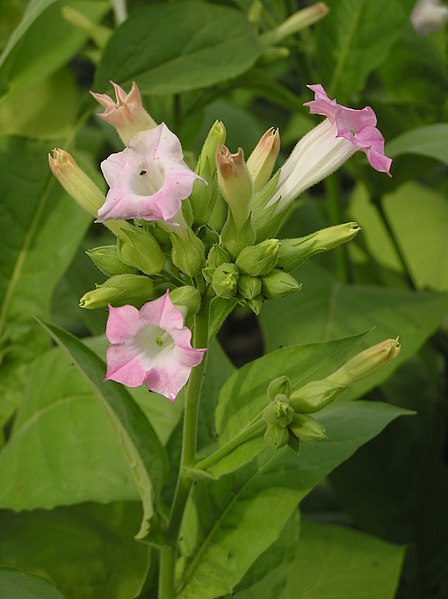Psychoactive plants are plants, or preparations thereof, that upon ingestion induce psychotropic effects. As stated in a reference work:Psychoactive plants are plants that people ingest in the form of simple or complex preparations in order to affect the mind or alter the state of consciousness.
The tobacco plant (Nicotiana tabacum) is an example of a psychoactive plant. The active constituent is nicotine.
Image: Starr 070308 5472 Coffea arabica
Image: Tabak P9290021
Image: Colcoca 03
A psychoactive drug, psychopharmaceutical, psychoactive agent, or psychotropic drug is a chemical substance that changes the function of the nervous system and results in alterations of perception, mood, cognition, and behavior. These substances have various applications, including medical use like psychedelic therapy, recreationally, or for spiritual reasons. Some categories of psychoactive drugs may be prescribed by physicians and other healthcare practitioners because of their therapeutic value.
An assortment of psychoactive drugs, including both street drugs and medications: Cocaine Crack cocaine Methylphenidate (Ritalin) Ephedrine MDMA (ecstasy) Peyote (mescaline) LSD blotter Psilocybin mushroom (Psilocybe cubensis) Salvia divinorum (salvinorin A) Diphenhydramine (Benadryl) (Unscheduled drug) Amanita muscaria mushroom (muscimol) Tylenol 3 (acetaminophen/codeine) Codeine with muscle relaxant Pipe tobacco (nicotine) (Unscheduled drug) Bupropion (Unscheduled drug)
Alcohol is a widely-used psychoactive drug. The global alcoholic drinks market was expected to exceed $1 trillion in 2013. Beer is the world's third-most popular drink, after water and tea.
Zoloft (sertraline) is an SSRI antidepressant.
Historical image of legal heroin bottle







